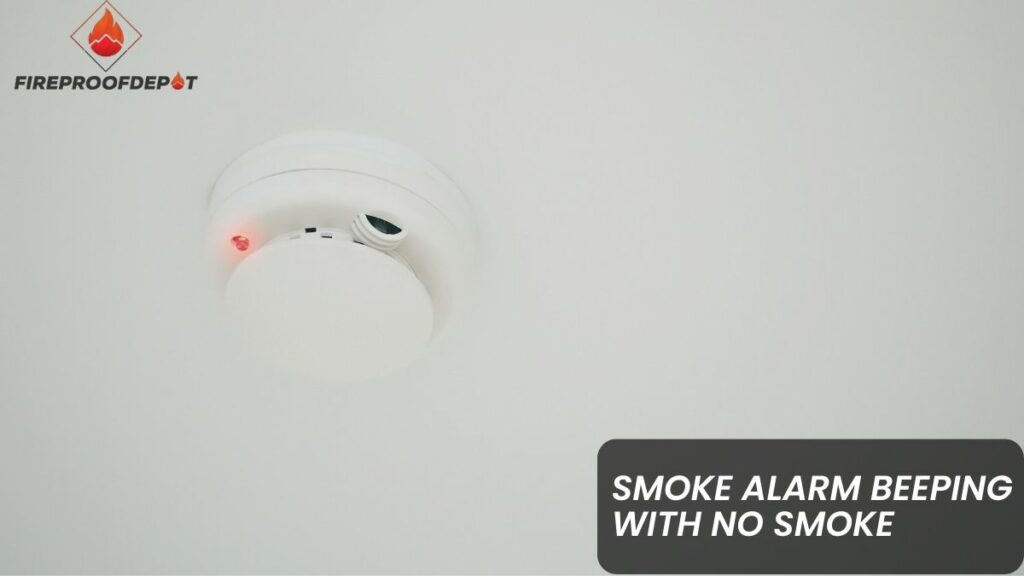In the hustle and bustle of our daily lives, few things can be as unsettling as the shrill, relentless beeping of a smoke alarm, urging us to take immediate action to protect ourselves and our homes.
However, what if the smoke alarm is beeping, but there is no smoke?
Smoke alarms may beep without smoke due to low battery voltage, requiring immediate replacement. Dust or debris accumulation within the alarm’s sensors can trigger false alerts. Electrical interferences, such as power surges or radio frequencies, might also be responsible.
You need to have a better understanding of why such incidents happen so that you can solve them yourself. And I am here to help you regarding this. Let’s begin.

Common Reasons For Beeping
Several common reasons can trigger these false alerts, and understanding them is essential for maintaining the alarm’s effectiveness and ensuring the safety of your household.
- Low Battery Voltage: One of the most frequent causes of a smoke alarm beeping without smoke is a low battery. When the battery voltage drops below a certain level, the alarm emits a periodic beep to signal the need for replacement.
- Dust or Debris Buildup: Dust and debris can accumulate inside the smoke alarm’s sensors over time, interfering with their proper functioning. When these particles disrupt the sensor’s ability to detect smoke accurately, the alarm may trigger false alerts.
- Electrical Issues: Electrical interferences can also lead to false alarms. Power surges, voltage fluctuations, or nearby radio frequencies might disrupt the alarm’s circuitry and cause it to beep erroneously.
- Location Matters: The positioning of the smoke alarm within your home can significantly impact its performance. Installing smoke alarms too close to kitchens, bathrooms, or areas with high humidity can lead to false alarms due to steam or cooking fumes. Similarly, placing the alarm near air vents or fans can disturb the sensor’s sensitivity.
- Alarm Malfunction: In some cases, the smoke alarm itself may be faulty or nearing the end of its lifespan. Like all electronic devices, smoke alarms have a limited operational lifespan, typically ranging from 8 to 10 years.
- Temperature Extremes: Extreme temperatures can also impact the performance of smoke alarms. Cold temperatures might slow down the alarm’s response time, while excessive heat could cause malfunctions.
How To Stop When An Alarm Beeps With No Smoke?
When a smoke alarm is beeping without any smoke or fire, it can be both frustrating and concerning. Here are some steps you can take to stop the beeping:
- Check the Battery: The most common reason for false alarms is a low battery. Immediately replace the battery with a fresh one.
- Clean the Alarm: To remove any dirt or particles, use a vacuum cleaner with a soft brush attachment or a compressed air duster to gently clean the smoke alarm.
- Test the Alarm: After replacing the battery and cleaning the alarm, test it to ensure it functions correctly. To activate the alarm, press the test button for a few seconds. If the beeping continues, move on to the next step.
- Check for Electrical Interference: Verify that the smoke alarm is not experiencing electrical issues caused by power surges or nearby radio frequencies. Disconnect the alarm from the power source and run it on battery power alone to check for any improvements.
- Replace the Alarm: If all the above steps fail to resolve the issue, it is possible that the smoke alarm has reached the end of its lifespan or is malfunctioning. Smoke alarms generally have a lifespan of 8 to 10 years. Consider replacing the old alarm with a new one that meets current safety standards.
How To Prevent The Alarm From Beeping?
Below are essential measures to ensure your smoke alarms function optimally and accurately detect potential fire threats.
| Regular Battery Replacement | Check and replace smoke alarm batteries every six months to ensure sufficient power and prevent false alarms. |
| Routine Cleaning | Regularly clean the smoke alarm’s sensors and exterior to remove dust and debris that may trigger false alerts. |
| Optimal Alarm Placement | To avoid false alarms, place smoke alarms at least 10 feet away from cooking equipment and high-humidity locations. |
| Avoid Interference | Keep smoke alarms away from air vents, fans, and other electrical devices that may cause interference and beeping. |
| Periodic Testing | Test the smoke alarm periodically to verify its proper functioning and identify any potential issues early on. |
| Replace Aging Alarms | Smoke alarms have a limited lifespan of 8 to 10 years. Replace aging or malfunctioning alarms to maintain accuracy. |
Conclusion
Dealing with a smoke alarm beeping without any smoke can be a perplexing situation, but understanding the common reasons behind it is essential for maintaining the alarm’s effectiveness and ensuring the safety of your home.
